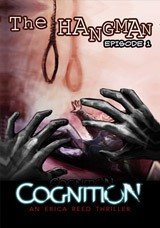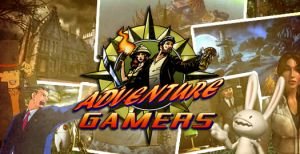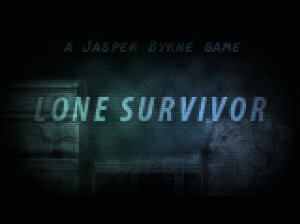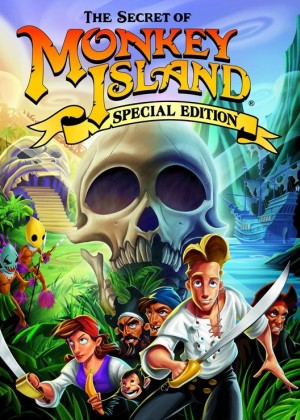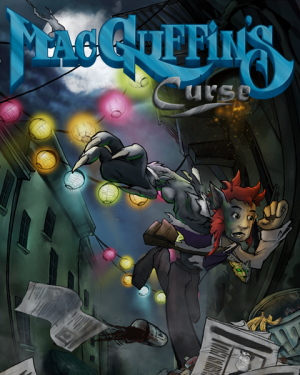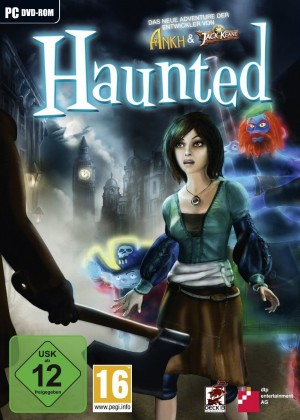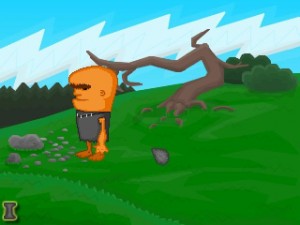César Bittar - Phoenix Online Studio interview
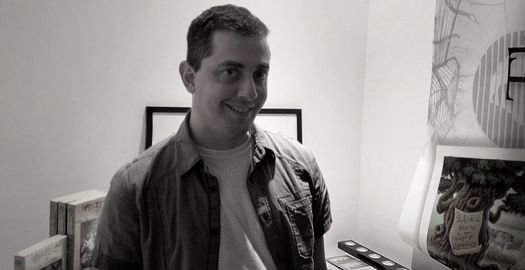
Most adventure game fans will know the name Phoenix Online from their fan-made continuation of the King's Quest legacy. But now Phoenix is ready to make an even bigger impression with the premier episode of their first commercial project, Cognition: An Erica Reed Thriller. With the launch date mere days away, we had a long chat with company CEO César Bittar about the new series, along with many other topics such as the turbulent history of The Silver Lining, César's relationship with Jane Jensen and his time at Telltale Games.
Ingmar Böke: Hi César, it’s a pleasure to welcome you here for your first interview ever at Adventure Gamers. To start us off, I would like you to introduce yourself to our readers and give us a brief overview of your work in the game industry so far.
César Bittar: Hi, Ingmar, it’s a pleasure to be interviewed here. I’m currently the CEO of Phoenix Online, and also one of its main Producers and Lead Designers. I enjoy doing all three, and I’ve been trained mostly in production as I worked with both Activision and Telltale in that area. But I’m a writer and designer at heart, and as Phoenix Online grows I look forward to hanging up my Producer hat and dedicating myself fully to design, as well of course as my responsibilities as CEO.
Ingmar: You've said that everything started with your love for adventure games, and that even now you haven’t stopped being a fan. Guide us through your journey as an adventure game fan to the point where you became a developer yourself.
César: There was a time in my life where I would almost only play adventure games. Other genres just did very little for me, and although I did play some of them and some games I truly enjoyed, such as Dune the strategy game or Lands of Lore, my heart was always in the magnificent adventure titles. Especially those of Sierra, but also the ones from LucasArts and other companies such as Westwood (love Kyrandia!). Those are games that I always go back to – in fact, I’m currently replaying Indiana Jones and the Fate of the Atlantis, one of my all-time favorites.
 |
César Bittar |
When I was a teenager, I used to live for Sierra titles. Anything that came from that company, I used to anticipate with a lot of excitement. Any time there was a new Space Quest, Larry, Gabriel Knight, or King’s Quest, I would read all the news, and expect the games dearly. The first titles I ever played, I think, were King’s Quest 3, Larry 1, and Police Quest 1. And from there, I played probably about 85% of all the adventure games that came in the '90s. I would devour them, and always beat them without any help. I wish today sometimes I had the patience (and time!) to finish an adventure game without cheating with a walkthrough as I did back then, but hey, times change.
The reason for my love of adventure games is simple: They provide a different story that you don’t find in any other genre. I used to immensely enjoy JRPGs for a while, but there was a moment in which they all became the same to me, and that’s something that adventure games never suffer from. The source material seems wider, the situations more expandable, and even if the mechanic seems the same, there’s much more difference to be found between adventure games than there is in games of any other genre. That’s probably why they never grow old to me.
Ingmar: As one of the main driving forces behind The Silver Lining, it's no real secret how much you love King’s Quest. Talk about your connection to that series with some personal highlights from the King’s Quest legacy.
César: You’ll find this funny, but King’s Quest is probably the series I was alienated from the most in the Sierra catalog as I grew up. Aside from having played a bit of King’s Quest 3 when I was a kid, the first time that I really played a King’s Quest was KQ6. It’s the most wonderful game in the series. I also loved KQ7, which reminds me of a very special Christmas. I think I’ve told the story of how I played it before: I used to have a 1x CD-ROM, and the screens would take 5 to 10 minutes to load, but even at that, I got all the way to chapter 4 before I migrated to a faster computer. But that’s how dedicated I was!
Ingmar: A lot of people (including me) agree with you that King’s Quest 6 is the best KQ game. What are your reasons for believing that?
César: Well, there’s no denying it has the stamp of Jane Jensen, and it no secret she’s my favorite adventure designer. It made for a more complete world, and richness of its lore. I was in love with the lands of the Green Isles. But beyond that, I also loved how it was so diverse within itself; how you could jump from isle to isle and see completely different settings. I tend to love games that do that. Megaman is one of my favorite games because I can choose between eight different worlds to play right from the beginning. Demon’s Souls did the same and I absolutely loved the game. That freedom was the number one reason why I loved King’s Quest 6 so much. One day, I can only hope Phoenix is big enough to allow me to create a world as rich as that.
Ingmar: Phantasmagoria is another stated favorite of yours (good choice!). Tell us about those reasons and your thoughts on FMV in general.
César: Phantasmagoria revolutionized what I wanted from games. It was the first true cinematic experience I had when playing a game, and that stirred something in me that made me want to go into the videogames industry. See, I always wanted to do films, but loving games as well, what better place than somewhere where you could do both.
My experience with Adrienne and her haunted mansion touched me in ways you could not imagine. I was so obsessed with the game that I actually recorded the whole thing using a camcorder, and edited it to show it to my friends.
 FMV didn’t last long, of course, but as 3D grew, it gave me the same feeling of real cinematic experiences. The first time I truly experienced that was with Final Fantasy VIII, and that’s how I came to love the Japanese RPGs. Xenosaga is probably one of my favorite games out there, with its one-hour cutscenes that were incredible to look at.
FMV didn’t last long, of course, but as 3D grew, it gave me the same feeling of real cinematic experiences. The first time I truly experienced that was with Final Fantasy VIII, and that’s how I came to love the Japanese RPGs. Xenosaga is probably one of my favorite games out there, with its one-hour cutscenes that were incredible to look at.
Nowadays I’m a little less inclined towards extremely long cutscenes with no gameplay in between. I guess as I started to play the big game titles in the past three years, I understood the value of interactivity in the hands of a player. Because of that, I would probably never opt to do an FMV game, but I was replaying bits of Gabriel Knight 2 last night, and when it’s done right, it shines. There’s something so organic about real people that will never be replaced by the wonders of 3D technology.
Ingmar: Speaking of Gabriel Knight, that series also left an enormous impact on you. Talk about your fondness for GK and your first memories of the series.
César: Gabriel Knight was the first mature story I played in my life. It was suddenly what made something click in my head as to say: “hey, games can also be about mature subjects and it works like a charm.” Of course, everyone who’s played Gabriel Knight knows that Jane pulls no stops when telling her stories, and to experience something as beautiful as the tragic story of Malia Gedde and Baron Von Glower, watch the full nine minutes of a lost Wagner opera, or find the remains of Jesus Christ are moments that will never leave my memory. The smartly written dialogue and how it was all brought to life make the Gabriel Knight series my absolute favorite.
The first time I ever saw anything GK-related was an ad in Computer Gaming World magazine that folded out and had four Sierra games: Quest for Glory 4, Police Quest 4, Larry 6, and Gabriel Knight. There was just something so mysterious about Gabriel Knight that it jumped right to the top of my most wanted games. But when I finally got it, it wouldn’t run on my computer, so I had to stalk my friends to let me play it on theirs, until I finally convinced my dad to buy me a 486 system. I also remember that I pissed my dad off when GK2 came around. I wanted the game so badly, but for my birthday he gave a leather jacket instead. You have no idea how much I hated that leather jacket, and being the bratty teenager I was, I complained until I made him mad. It was finally my mom who gave me the money to get the game. I’ve always gone extreme lengths to get my hands on these jewels.
Ingmar: Now we all know why you wanted to have Jane as a story consultant on your upcoming project Cognition. Talk about her involvement and how much impact it's had on the game, and on your own evolution as a writer.
César: Working with Jane has, of course, been a dream come true. It’s one of those things you dream of having the chance to experience as you grow up, but even though today it’s part of my life, I sometimes have to stop and think, “Am I really working with Jane?”
She has been very open and great to work with ever since we met. She placed her trust in a very young team, and for that I will always be very grateful to her. As far as what it is like to work with her, I really sometimes don’t believe it, especially when she rings me on Skype to ask me about feedback on this or that. There’s a bond now between us where there’s trust going both ways, and that to me is just about the most wonderful thing that has ever happened to me – and at the same time, the scariest, because I feel I must meet very high expectations (trust me, Jane doesn’t take “no” for an answer when she wants something!). In a way, I see myself in her, because I can be exactly the same way.
Her work on Cognition has defined the ultimate direction the story took. After discussing it a lot with my co-designer Katie Hallahan, we came up with a bunch of different seeds for what could be the major plot, and then we brought those ideas to Jane, and she gave us perspective, helping us to simplify the themes. If it wasn’t for her, the game would have been battling between the actual theme of Cognition and some murders based on Shakespeare at the same time. But Jane was immensely helpful in making us let go of one of the ideas and focus 100% on the other, which has made the story as good as it is evolving to be now.
Beyond that, she’s worked with us on every episode, giving full feedback and again helping us to simplify when ideas get too crazy. She has even written certain lines that you’ll see in some of the episodes, as she did a full pass through the dialogs, editing as much as she could, and leaving a bit of her sass here and there. She’s done that with three episodes so far, and she will do it on the final episode as well.
So yes, it’s been great and it’s helped to strengthen what’s still to come from that relationship.

Exclusive first look at Cognition's Old South Meeting House of Boston
Ingmar: With Cognition nearly ready to launch, can you share some more details about this promising project?
César: Cognition is the story of Erica Reed, an FBI agent who has the unique ability to see the past of any object she touches. As the game begins, she’s on the hunt for a serial killer who has kidnapped her brother, from which one of the main storylines will develop.
Erica is a very special character, because she has a strength that never stops her from pursuing what she wants and accomplishing what needs to be done. I’ve always liked strong female protagonists, and Erica is tough as nails. But that determination has a bad side to it, a curse of sorts that follows characters like her who are magnets for bad things happening around them. We often joke that she’s a female Jack Bauer.
I cannot reveal much more than that because it would start to spoil the story, but what I can say is that all the work that has gone into this project has made it very special. As I do the final playthroughs of Episode 1, I’m happy to see so much that I imagined and wrote come together in such a wonderful way. There are some really touching moments in the game, and I think the story is shaping up to be very solid, so hopefully people will be able to enjoy playing it as much as we’ve enjoyed creating it.
Ingmar: Even though Cognition is a classical point-and-click adventure game, it feels very fresh due to Erica’s special abilities. Tell us how Erica’s abilities contribute to the gameplay.
César: Erica’s power starts simple and as the game develops, she acquires new abilities that let her to do more, such as “Projection” allowing her to pull memories from the environments to interact with them, and “Regression”, with which Erica can access people’s memories to help them remember something specific.
Everyone who’s played the game so far has thought that Erica’s abilities are really awesome. That’s great, because I wanted to borrow elements from other genres, since adventure games do not often include any powers or abilities – specifically ones that evolve as you go along, which is more commonly found in RPGs or action games. I’ve always tried to blend genres a bit in my designs, like I did with the fight sequence at the end of Episode 4 of The Silver Lining, with a sequence akin to a turn-based combat system. Trying to bend the rules is something that is very difficult to do with adventure fans, and it's a fine line to walk, but I'm glad people think we've done a great job and that they are enjoying the mechanics thoroughly.
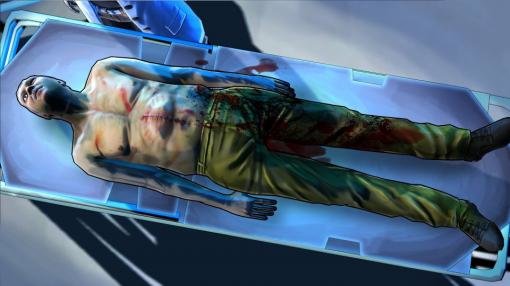
Ingmar: Heavy Rain seems to have left quite an impression on you. How will its influence be noticeable in Cognition?
César: Heavy Rain was something I truly enjoyed. Going through some of the sequences in which you advance by making drastic choices was something that really stayed with me. In that respect, there are some really horrible actions you have to play through in Cognition in order to achieve a goal. I won’t spoil it, but again we’ve received some great feedback from people who have experienced it. As with Heavy Rain, Cognition will have moments that are not for the faint of heart!
Quantic Dream's influence also relates to the choices you can make. Although Cognition is not quite like Heavy Rain with its multitude of choices and paths, there are certain choices that you can make that will change your experience of the game. For example, there are puzzles that you can fail to solve, but the story continues and takes you down a different path. Or in the way you treat your co-workers, or who you decide to accept help from and how... it all adds to different experiences that players can have, which of course allows for some good replayability. Some puzzles will change and the situations will be different depending on the choices you make or how well you do your job.
Ingmar: You’re working with Romano Molenaar, an artist who has quite a track record. How important has he been to the distinctive look of Cognition?
César: Romano is an incredible artist and he’s helped us nail the look of the game which everyone seems to love. His art was so special that we decided to go full 2D in order to feature it directly in the game. He’s currently very busy working on a lot of great stuff like Batman for DC, so his time has become more limited for Cognition, but his art is still being used in each episode, as he had much of it created by the time we started working on the game. He’s also worked closely with our guys to make sure that his particular look stays all the way through the season. We are very happy to have had a chance to have him as our Art Director, most definitely.
Ingmar: Austin Haynes did quite an impressive job with his work on the The Silver Lining, so it’s no suprise you’re working with him again.
César: I call Austin “The Master Composer.” He’s simply a genius, and I couldn’t be working with a more talented guy. A lot of directors and designers always have a composer of choice that they go to, and those relationships strengthen with the years. That’s how I feel about my bond with Austin. We have synced to the same wavelength where I ask for something and he knows exactly what to deliver.
It wasn’t like that always. Whereas it took him one try to come up with the beautiful Cognition main theme, it took him about ten tries to come up with the main theme for The Silver Lining. But, like I said, through the years he’s learned to read my mind and provide the music that makes me tick.
Music is extremely important to me. As obsessed as I’ve been in my life with videogames, I’ve probably been twice as obsessed with music. Music is what inspires me to write, what can make me like a badly written movie, what I must have in order to be able to relax and accomplish my work. So I’m exactly at the same level as Austin when we think about the importance and impact music has in a game.
We have this system in which I walk him through exactly what I’m looking for and he provides exactly that, probably better, and his own particular style is one that I’m very fond of. I feel very connected to the process, and we both enjoy it greatly, to the point where there’s almost an exclusivity in the way we create music. Even if I’m not the lead designer for a particular episode, he will still work with me on the music. And that’s honestly something I’m glad about, because if there’s one thing that has never failed in our games, it is the powerful music that Austin composes and I produce.
As far as the score for Cognition, it’s a mix of piano and electronic music, all covered in Austin’s touching style. There are very beautiful melodies and breathtaking piano, but the atmosphere of Cognition also has an edge that we couldn’t have explored with something like The Silver Lining. So this is definitely something you want to get your hands on and give it a spin. In fact, you can get the soundtrack if you pre-order the Season Pass currently, and it’ll be sold on our website separately soon as well. Definitely don’t hesitate to at least listen to the samples!
Ingmar: Robert Holmes is also involved as composer of the song “The Taking”. Tell us about the song, and what Robert’s contribution means to you as a long time fan.
César: After finishing Gabriel Knight 3, I went ahead and started going through the resource files from the games and looking for midi files online, and for the soundtrack of Gabriel Knight 2 in order to create my own GK soundtrack. I took pieces that were 30 seconds long and edited together with other similar short pieces to create full themes. I even asked a friend of mine to compose a full track based on the love theme of GK3 – a slowed-down version of the main theme that plays during a scene with Gabriel and Grace.
That is how much I love Robert’s music, so of course having met him and getting to talk with him on occasion, I really wanted him to do something for the soundtrack. So we had a chat, I asked him if he could do the main song for the game, and he agreed to do it. We discussed the themes of the game, what I was looking for, and a couple of months later he came back with this amazing song called “The Taking.” You really have to listen to it and hear how great it is.
Ingmar: The song is performed by his daughter Raleigh, already known to adventure gamers for her contribution on Gray Matter and her appearance in the Kickstarter video from Pinkerton Road. But here she is expanding her role to include the voice acting for Erica Reed. What can we expect from Raleigh as a voice actor?
César: Oh, man, Raleigh is incredible. I don’t know if I’ll develop a syndrome where I’ll have to cast her as all my main female characters, but she has such a hypnotizing voice that you don’t want to stop listening to. As one of our team guys says, “I’d like to marry to that voice!” She’s truly fantastic.
She’s also a sweetheart and very dedicated to what she does. We’ve put her through a lot of screaming and she even managed to damage her vocals during one of the recordings, which is really bad because she’s a singer, so we had to be more careful the second time around.
But yes, Erica’s voice is superb, and Raleigh is also a great actress, so on that front, we are totally covered. You are going to absolutely love Erica.
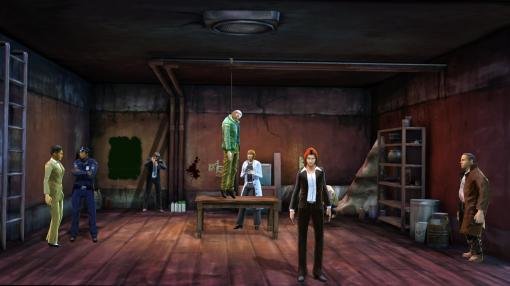
Ingmar: Cognition was officially described as a game in the spirit of Dexter and Heavy Rain. We’ve talked about Heavy Rain, so let’s talk about Dexter now. What is it that fascinates you about that great show, and how much has it been an influence on Cognition?
César: The show is just so well written. I just watched the first episode of the new season recently and man, it looks like it’s going to be the best season yet! There’s a lot of witty writing in Dexter, but beyond the mature subject, there’s also a lot of heart-felt emotions going through the characters, and I really like that. And there’s of course the fact that there’s a lot of serial killers involved and Cognition has a bit of that in as well. But to say more would be to spoil a few surprises.
Ingmar: Will every episode end with a cliffhanger that leads to the next episode, or will each episode stand largely on its own despite having an over-arching story angle?
César: Towards the beginning of the season, the episodes have their own story, but there’s an overarching plot that connects pieces of each episode. But that’s all I can say about this without spoiling it!
The good thing is that this has allowed us to have multiple designers that each take a different episode. I, for example, did Episode 1, while Katie is taking care of Episode 2, and I’m working with Nick Bryan on Episode 3. Which is necessary in episodic content.
Ingmar: As a former Assistant Producer for Telltale, what projects were you involved in and what lessons did you learn during your time with the company?
César: Working at Telltale was a great experience. I had the chance to help out with Tales of Monkey Island and especially Wallace and Gromit and Sam & Max: The Devil's Playhouse. They work at a very fast pace and jump from project to project in the blink of an eye, so the experience was incredible. I did so much in the time I was with them, and I worked alongside some of the finest and most talented people I’ve had the pleasure to ever work with.
Ingmar: With recent projects like Jurassic Park and The Walking Dead, it seems like Telltale has moved on to a new direction and adventure fans may have reason to worry that they'll never return to their classic adventure game roots. How do you feel about this and what kind of evolution do you expect from Telltale in the next years?
César: I honestly feel that Telltale has hit the point of no return in their own way. They found what they’ve been looking for in The Walking Dead and finally hit it huge. And that’s part of the evolution of every company. They’ve always been about the cinematic experience and the interactive stories first, and that they’ve managed to hit that quality with The Walking Dead means that we’ll see amazing things from them in the future.
Unfortunately for adventure gamers, it might also mean that they won’t be able to come back to the smaller projects. But who knows, I’m not privy to what goes internally. Whatever they do, I’m sure it’ll be great. And hey, if they don’t go back to doing traditional point and click adventures, then that’s great for up and coming studios like Phoenix Online, because that gives us a better chance in the market.
Ingmar: You previously alluded to a possible new project with Jane Jensen beyond Cognition. Any update on that?
César: Something’s brewing, but nothing that has been officially announced yet.
Ingmar: You spent a weekend at the Pinkerton Road farm with Jane Jensen and Robert Holmes. What are your lasting memories of that weekend?
 |
César with Jane Jensen |
César: I have a very particular memory of us stopping at some gas station or something as a pit stop just minutes before we reached the farm. I stood there with Vitek Goyel, Phoenix’s Vice President, and I just couldn’t believe I was about to say hi to Jane Jensen face to face. I’ll never forget giving her a hug when we greeted, sitting down to eat the dinner she had prepared for us, and then staying up late talking – she questioning everything we did, going from one topic to the next, asking for an explanation of who we were and what we did.
My more vivid memory, however, was sitting down around a computer with them, showing them some hilarious YouTube videos of Gabriel Knight 2 that a fan had put together by editing the original footage of the game. Hearing Jane and Robert laugh that hard was something I’ll never forget, because deep inside, I would stop for a second, come out of the moment, and ask myself “hey, are you really here? Is this really happening?”
Jane has a really interesting library, and a very creepy barn. An awesome basement. And a big heart. Both she and Robert were awesome hosts.
The last morning I was there, I came down very early to have coffee with them, and Robert mentioned how we had inspired them. Seeing now how Jane went forward with her Kickstarter for Pinkerton Road, and is on her way with Moebius, if there’s anything we had to do with convincing her to do that, I’m very happy.
You can read more in my blog post of last year, when I had a clearer memory of what just had happened.
Ingmar: Not that long ago you also met with Al Lowe. Tell us about that meeting and what it was like to meet the father of Leisure Suit Larry.
César: Oh, well, what can I say, Al is a great guy. He’s very lovable, really!
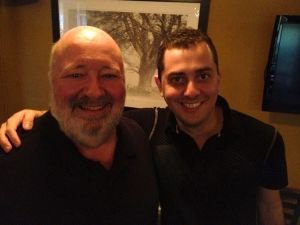 |
César with Al Lowe |
My good friend Eriq Chang, Art Director of the newly announced Hero-U campaign from the Coles – and a fellow devoted Sierra fan – and I had the chance to meet with Al in Seattle last year. We had lunch at this great restaurant, and we spent a couple of hours letting him tell us stories from his Sierra time. I don’t remember all the details of the conversation, but I do remember having an amazing time with him, and being privy to things that probably not many people know about, such as why Sierra used headshots of the designers on the boxes.
I’ve talked to Al a couple of times since then. We wanted to do something with him, but it didn’t work out at the time. Who knows, maybe one day we can get him to work on something with us.
Ingmar: You also fulfilled a dream that probably most Sierra fans have: you met with Ken Williams.
César: I have been in touch with Ken for a very long time. I was even part of a small project he wanted to do over the internet a little while back. But meeting him in person, having the chance to have breakfast with him on two occasions, that’s a completely different thing, and it was one of those memories that will always be very precious. Especially the second time, as it was just the two of us. The determination to do something like that is one of my best accomplishments, because let me tell you, Ken's intelligence is a bit intimidating, and you need to be able to keep up with his conversations and thoughts. I probably said something stupid once or twice, but I was very glad to hear him say how he wished Sierra’s games looked as good as The Silver Lining did.
Again, since my memory fades too fast, I’ll refer you to the blog post I made that contains more details.
To be honest, I consider myself a very lucky man. Not everyone gets the chance to meet their idols, and I think I’ve met all of them – I’ve even travelled by bus with my favorite band, but that’s another story. I have to say that if Phoenix Online succeeds, I will have accomplished most of my dreams in this lifetime. So if you ever have a dream, believe in it and follow it. You’ll bang your head against a wall every once in a while, but eventually, if you persevere, good things will happen. Not always exactly the way you expect them or want them, but good things will happen nonetheless among the many hiccups. But that’s life, huh?
Ingmar: Which adventure games are you currently looking forward to, and for what reasons? Let me take a guess... Moebius and Mystery Game X come first?
César: Of course! I’ve had the chance to spend a little time with both, and they should top everyone’s list! I’ve read the Moebius story and design, as Jane asked me for feedback (again, I still can’t believe my idol is asking me for feedback!), and you are all in for a treat! It’s a very original story and the start of a great saga.
But we don’t want Jane to send a werewolf my way, so I’ll stop that thread of discussion right there.
Another game I’m really looking forward is Beyond: Two Souls. After enjoying Heavy Rain so much, I can’t wait to see what David Cage has in store. Then of course we have all the powerhouses coming back: I’m sure Tim Schafer and Ron Gilbert’s new adventure will be phenomenal. The Two Guys from Andromeda's game will kick ass, and Broken Sword 5 going back to its beautiful roots is going to be amazing. And a new Tex Murphy!! And then we also have games like Agustin Cordes’ Asylum. So the future is looking very bright for adventure games, for sure!
Ingmar: The name Jane Jensen is becoming ongoing theme in this interview, but when I first met her she told me that she sees a gigantic market for adventure games – the problem is that we haven’t found a way to approach that audience yet. What do you think adventure game developers and marketing people have to do different to reach out to that audience and where do we find it?
César: I think that if knew the answer to that question, Phoenix Online wouldn’t be a struggling indie developer.
I think that things need to evolve and adapt. Heavy Rain found a market. The Walking Dead found a market. Those may not be the most traditional adventure games but are based on the same principles. Everything changes from one decade to the next, from the way we dress to what’s cool at the movies, to how they edit TV shows.
And maybe adventure games need a kick in the butt in that sense. Again, Heavy Rain was very successful, and there was a lot of subject matter in that game that a big audience received greatly. So maybe the way to reach that audience is by experimenting a bit more, by letting go of the conceptions we have of what defines an adventure game, and asking how we move forward from there. I don’t know.
For the time being, I’m happy of designing traditional point-and-click adventures. I’m sure at one point, I’ll want to do something different.
Ingmar: I don’t want to finish without talking about a project that has so much to do with your roots as a loyal Sierra fan: The Silver Lining. Take us back to your early days as a game developer.
 |
L-R: Phoenix Online's Vitek Goyel, César Bittar, Katie Hallahan, and Weldon Hathaway at GDC
|
César: Back then, those of us who became the senior members of the Phoenix Online team were all just a group of fans looking for the next King's Quest. That’s how we found each other. Individually, we looked on the internet and we found a website looking for people to do a fan continuation of the saga. So I thought, "hey, I can write, they are looking for writers, why not?"
The project didn’t go much of anywhere for a long while. Then a year and something later, I became its Producer/Director, and although I had no idea what to do, I must have done some things right. It took us about eight years from that point to finally release the first episode, and along the way there were many headaches, fights, and people insulting one another, but there was also a great sense of teamwork, of realizing how much talent existed among us, of learning how to channel that talent. It was a full and complete process that took a long while, but that basically became the university that taught us the career that we have today.
Because of that, The Silver Lining will always have the most special place of my heart. It was, to put it simply, my formation; it was the only place where I had the chance to do as much as I did with it, where I was able, through those long eight years, to direct every shot, every line, every piece of music, every single moment. You don’t get that luxury in projects with a much faster development cycle, so the chance that I had with The Silver Lining I will really never have again. I’m grateful that I did have it.
Ingmar: The game's development was a constant up-and-down struggle, with many obstacles that could have prevented TSL from ever appearing on our screens.
César: The Silver Lining has received two cease and desists, one from Vivendi and another from Activision. In both cases, we were saved by fans. But to be honest with you, it was with Activision where we truly were saved by the fans. That should not diminish the efforts of the first campaign, however! I remember at one point Vivendi's PR asked me to "please make them stop!", referring to the fans, of course.
But with Activision, when we got that one, I really thought that was it, that we were not going to be able to release TSL. That went on from the point when we received the cease and desist for about two months. We knew the fans were pushing for us, but it felt so final that I didn't want to get my hopes up that lightning would strike twice like that.
By then we were already experimenting, looking to see what to do with all the assets we had. And then, out of the blue, I received a call from my contact at Activision. He wanted to speak with us about allowing us to release The Silver Lining. I think that remains the best call that I have ever received in my life! Later, we found out from a guy in the press who worked for Activision's PR at the time that there were huge stacks of letters piling up on his boss's desk from all the fans. It was this person who contacted the senior management of Activision in order to push for allowing The Silver Lining to happen. So, when it came down to it, it really was all thanks to the fans who never stopped believing in and fighting for us!
The rest is history…
Ingmar: Tell us about the concept of The Silver Lining. What can players expect, depending on whether or not they know King’s Quest already.
César: If you know the world of King’s Quest and are looking for the Harry Potter version of it, then you are going to truly enjoy The Silver Lining. When I was writing the story, I wanted to write something a bit darker and more mature. But fear not, because as mature as the plot can be, the same familiar KQ light-heartedness is still present everywhere: the same fantastic characters, the Green Isles in all of its splendor, and the funny situations Graham has to go through in order to save his family. All of that continues here, only wrapped in a layer of darkness that I believe makes the story a lot more compelling and allows for more drama –which is very necessary in the episodic model we adopted.
If you have never played King’s Quest, then you are going to find yourself on an excellent fantasy adventure that is going to grip you from beginning to end.
Ingmar: What’s the status of the last episode?
César: Episode 5 will take a while to come out. In fact, I have to say that we don’t know when it’s going to be released, as the current commercial line-up of Phoenix Online seems to be growing (which is great!). From Cognition we will be jumping into a second project and possibly a third, so it’s very hard to find the time to dedicate to Episode 5.
That said, we do have a volunteer team working on it, and although they are doing an amazing job under the guidance of the ever-charismatic Adrienne Elliott, the Associate Producer in charge, they depend on many of us to move forward, and we are currently drowning in our commercial work.
However, if history has shown me anything, it’s that we never give up. So it’s just a question of when: When will we come to a place where we’re comfortable handling different projects and still have a life outside work; when will we find the right way and the people to do the game. In the meanwhile, Adrienne has the full written script and they are working on the animations, the environments, the scripting, etc.
One thing is for sure: it took us ten years to get to the point where we released the first 4 episodes. We want to go out with a bang, so as the old saying goes for these kind of projects, “it’ll be ready when it’s ready”, but you can rest assured it’ll come with the full experience of a commercial company behind it, and all the good things that experience brings with it.
Ingmar: How did you get to the decision to make The Silver Lining an episodic game (and Cognition as well)? Did it have something to do with your personal experiences with Telltale?
César: Yes it did. It came from a meeting I had with Dan Connors and Kevin Bruner of Telltale, where I showed them the game. Dan asked, “Would you be able to make an episodic game out of it”, and although my immediate answer was “no” because of the structure it had, the idea stayed with me through the day. And by that night, I already had a plan on how to structure the game into five episodes. I rushed to tell the team, and we started to implement the idea. It has been the best thing that has happened to The Silver Lining.
Ingmar: Roberta Williams gave you some very cool feedback after she played the first episode.
 |
César with Ken Williams |
César: We first heard from Roberta around 2002 when she responded to an email we sent her. In that mail she said she would be “cheering from the sidelines” for us. That was really amazing because the queen herself had taken the time to write to us. Then, in 2005, we held a chat on our website and invited Ken Williams, and although Roberta didn’t join us, Ken said that he had never seen her as excited over a fan project as when she had to sit down to admire the screenshots that we were releasing that day to the public. And finally, in 2010, she played the first episode and this is what she had to say, together with Ken's words in the email:
“…I am deeply honored that a group of devoted fans have dedicated themselves to reviving the characters, lands and quests of my adventure game series, King’s Quest. Without the bravery and persistence of these volunteers – and it should be stressed that this game was developed by fans over ten long years without pay and in their own free time – it is almost certain that King’s Quest would have been relegated to a forgotten obscurity – its story left untold. Now, there is a chance that many can truly find out what happens to the royal family of the Kingdom of Daventry.This game is very true to the original series and features many of the storylines and characters, especially, of King’s Quest VI. I found it beautiful and fun to play. I, too, like many other fans, would like to see how this story unfolds!
Roberta Williams
…”
We are amazed that your group has done this!
Ken W
Ingmar: Thanks a lot for doing this, César. I know that it took a LOT of your time, but we surely appreciate it. Any last words for your fellow adventure game fans?
César: I don’t think I have any words left! Thank you Ingmar and Adventure Gamers for the opportunity, and hopefully some readers made it all the way to the end here with us!



